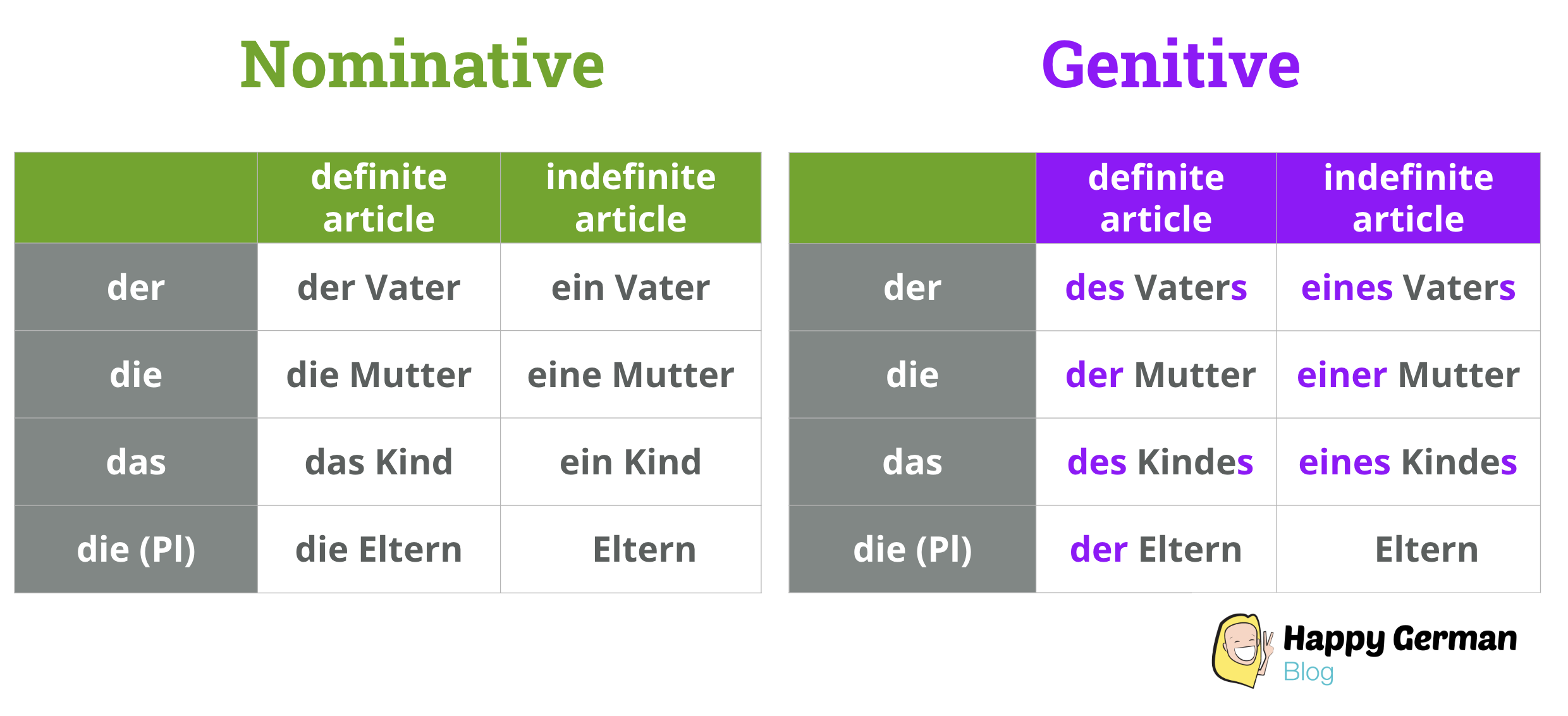Süßer Genitiv... Sweet Genitive...
A life without you is impossible to imagine...
Oh wait!
Just kidding!
I know a guy who knows a guy who has a German cousin and he found a way of avoiding the Genitive by using "von" + Dative instead.
So much for the poetic introduction.

The Genitive case is dying out.
Okay, not quite, but you can see here and there that the official Genitive case is being put aside, replaced or bypassed altogether.
If you are the visual type, please watch Anja's video on the Genitive. It's fun!
The Genitive Case In Spoken Vs. Written German
German speakers, natives and non-natives tend to work around the Genitive case in the spoken language.
Maybe it’s just easier to not use it for some people.
Either way, people often avoid this beautiful case in normal conversation and use the preposition “von” (of) + Dative instead.
People often have a hard time using the Genitive case correctly. Maybe they feel intimidated by it.
But there’s no need to be afraid of the Genitive case.
All it takes is a bit of practice. Nowadays, you'll mostly see it in the
- written language, such as
- in technical documents and
- literature.
How To Form The Genitive Case
Take a look at the grid below. As you can see, there aren't that many changes to worry about.

Examples To Show How People Replace The Genitive
Written German with the Genitive:
- das Auto des Mannes (the man’s car)
- die Tasche der Frau (the woman’s purse)
Spoken German without the Genitive:
- das Auto von dem Mann (the man’s car / the car of the man)
- die Tasche von der Frau (the woman’s purse / the purse of the woman)
So, what happened here?
→ Basically, instead of the Genitive we use the preposition “von” and the Dative case.
What? Don't tell me you thought you wouldn’t have to use a case at all?
In written German
- we use the Genitive case, for example
- in technical documents and in literature.
In spoken German
- the Genitive case is often replaced by "von" + Dative case.

Using The Genitive Case With Names
What stays the same in written and spoken German is the use of the Genitive with names. Just like in English, we use the ending “-s” after the name.
- Gogos Buch (Gogo's book)
- Peters Fahrrad (Peter's bicycle)
- Anjas Video (Anja's video)
→ However, Germans don’t use the apostrophe for the Genitive in names like we do in English!
Well, that’s not entirely true.
In names that end with an s-sound we do use apostrophes.
Take a look at the following examples:
- Max’ Geburtstag (Max's birthday)
- Beatrice’ Arbeitsplatz (Beatrice's job)
- Jens’ Musik (Jens's music)
→ This is only important in writing, though. When we say them–since you cannot pronounce the apostrophe–the name on its own sounds the same as with the apostrophe.
In written and spoken German,
- names plus the Genitive -s ending are used in German without apostrophe.
Compare German: Anjas Video (English: Anja's video)
- Names that end in an s-sound use the apostrophe only.
Compare German: Fritz' Haus (English: Fritz's house)
In the next few sections you’ll learn where the preposition “von” + Dative can or even must be used instead of the Genitive in written German.
When Do We Use "von" + Dative Rather Than The Genitive?
This section here is mostly relevant for written German. As we already know, it’s very common for people to avoid the Genitive case in spoken language.
Now, we’ll take a look at some situations where you use “von” + Dative instead of the Genitive – even in writing.
A noun standing by itself
- der Bau von Häusern (the building of houses)
- der Preis von fünf Smartphones (the price of five smartphones)
- ein Gefühl von Einsamkeit (a feeling of loneliness)
In a descriptive phrase
- ein Gemälde von großem Wert (a painting of great value)
- eine Dame von faszinierender Schönheit (a woman of fascinating beauty)
When using personal pronouns
- einige von euch (some of you)
- ein Nachbar von ihm (a neighbor of his)
Pronouns that describe amounts, or parts of a set, like "wenig" (little), "viel" (much/a lot), or indefinite pronouns
- viel von dem, was sie weiß (a lot of what she knows)
- welcher von diesen Filmen? (which of those movies?)
- etwas von deinem Erfolg (something of your success)
I’m sure you can think of some more examples where you can use “von” + Dative instead of the Genitive case.

You are a fascinating beauty. (Literally: You are of fascinating beauty.)
Wanna know some tips for using the Genitive? Watch this video where Anja will tell you not so secret secrets!
Using The Genitive And "von" + Dative Together Or Interchangeably
In some situations it’s totally okay to use both the Genitive case and the alternative with “von” and the Dative in the same sentence. Sometimes you can also use the Genitive twice.
When is it ok to use both the Genitive and “von” + Dative?
1. If you want to avoid consecutive noun phrases with the Genitive
- der Hund von dem Bruder des Nachbarn (the dog of the neighbor’s brother)
instead of
- der Hund des Bruders des Nachbarn
→ It doesn’t really sound good to use the Genitive back to back in German, so if we have to show possession twice, we usually use the combination of “von” + the Dative and the Genitive .
However, you can still find structured sentences with two Genitive noun phrases, especially in technical or legal texts.
- Das Unterzeichnen des Vertrags beider Vertragsparteien ist zwingend erforderlich. (The signing of the contract by both parties is mandatory.)
2. With nouns that come after an adjective without an article
- der Bau von neuen Wohnanlagen (the building of new housing areas)
- der Bau neuer Wohnanlagen
3. If your first noun has an indefinite article, it will sound better to use “von” + Dative instead of the Genitive, even though it’s still okay to use the Genitive if you like.
- ein herrlicher Duft von süßen Keksen (a fantastic scent of sweet cookies)
- rather than: (ein herrlicher Duft süßer Kekse)
4. Nouns that have indefinite pronouns
- die Meinung von vielen Menschen (the opinion of many people)
- rather than: (die Meinung vieler Menschen)
5. In many, or most partitive constructions
- zwei von seinen besten Freunden (two of his best friends)
- rather than: (zwei seiner besten Freunde)
- viele von meinen Mitschülern (many of my classmates)
- rather than: (viele meiner Mitschüler)
6. When using geographical names that don’t have an article
- die Eroberung von Konstantinopel (the conquest of Constantinople)
- rather than: (die Eroberung Konstantinopels)
- die Hauptstadt von Deutschland (the capital of Germany)
- rather than: (die Hauptstadt Deutschlands)
Well done, you! You're almost there.
Because now it's time to test yourselves on all the interesting things you have learned here about the Genitive case and/ or "von" + Dative case.



